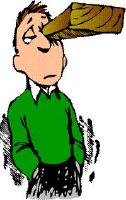
There is a duty of fault-finding. The Master Himself teaches it. In the Sermon on the Mount, He makes it very plain. We must note carefully, however, where the duty begins. We are to look first after our own faults. “Why do you look at the mote that is in your brother’s eye–but do not consider the beam that is in your own eye?”

We must consider the beam that is in our own eye!
The form of this question suggest that we are naturally inclined to pay more attention to flaws and blemishes in others–than in ourselves; and also that a very small fault–a mere mote of fault in another person–may seem larger to us than a blemish many times greater in ourselves!
Of course, it is far easier to see other people’s faults–than our own. Our eyes are set in our head in such a way–that we can look at our neighbor, better than at ourselves. Yet we all have faults of our own. Most of us have quite enough of them to occupy our thought, to the exclusion of our neighbor’s faults–if only we would give them our attention.
Really, too, our own faults ought to interest us, more than our neighbor’s, because they are our own; and being our own, we are responsible for them. We do not have to answer for any other one’s sins–but we must answer for our own sins, “Each one must give an account of himself.”
Also, the responsibility for getting rid of them, is ours. No faithful friend, no wise teacher, can cure our faults for us. If ever they are taken out of our life–it must be by our own faith, our own firm, persistent effort.
It is a fact, that the faults which we usually see and criticize in others–are the very faults which are the most marked in us! In our judgment of others–we show a miniature of ourselves. If this is true, we should be careful in judging others, for in doing so–we are only revealing our own faults! This should lead us also to close scrutiny of our own life, to get rid of the things in us which are not beautiful.
~ J. R. Miller, “The Duty of Fault-Finding”
